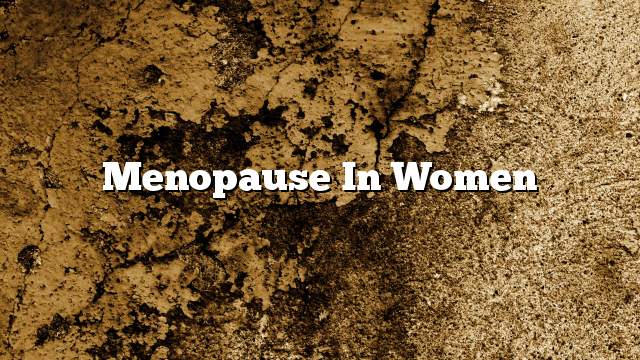Menopause
Menopause is defined as menopause for 12 months due to the cessation of ovulation. Women are no longer able to conceive and reproduce, and their occurrence is a natural biological change. This change occurs gradually. As the age of women declines, And estrogen production is reduced in various forms, which makes the woman’s body behave differently from normal, causing some symptoms and signs that vary from one woman to another. It should be noted that the average age of women at the age of to me Q is 51 years old.
Symptoms and signs of menopause
Symptoms and signs of menopause before menopause occur several months or years at a stage called Perimenopause, but menopause may start suddenly in special cases, such as cases in which cancer drugs are taken, and then symptoms are worse and worse. Symptoms often persist for nearly four years of the last menstrual cycle. Signs and symptoms of menopause include:
- Hot flushes: The sudden feeling of heat and sweating, especially in the face, neck, and chest.
- Night sweats: It is caused by hot flashes that occur during the night.
- Vaginal dryness: This causes pain and discomfort during sex.
- Reduced sex drive.
- Mood swings as depression and panic.
- Problems in memory and concentration.
- Palpitations.
- Urinary tract infections.
- Joint stiffness.
- Difficulty sleeping.
- Headaches.
- Hair loss.
- skin dryness.
Menopause complications
Some complications may occur after menopause, and it should be noted that their occurrence is not due to the arrival of menopause alone, but that progress in age itself plays an important role in their emergence, including the following complications:
- Heart Disease: Women have a higher risk of heart disease after menopause, making women more likely than men to have a heart attack, and women may experience irregular heartbeat due to a sharp drop in heart disease. The level of estrogen in the body, and the chances of heart disease can be reduced by a healthy lifestyle; such as abstinence, eating healthy foods such as vegetables, fruits, and whole grains.
- Osteoporosis: Estrogen plays an important role in bone health. It supports bone cells. Estrogen deficiency weakens bone building and increases the rate of destruction. This increases the risk of osteoporosis. The risk of osteoporosis is fractured. These fractures often occur. In the pelvis, spine, and wrist. This occurs at age, making the healing process slow, but the risk of osteoporosis can be reduced by eating foods high in calcium and vitamin D, and exercising regularly.
- Urinary problems: The problem of incontinence is very high in the elderly, especially after menopause. Women lose the ability to control urine output, especially when coughing or laughing. This problem can be reduced by abstaining from smoking and weight loss.
- overweight: Especially in the abdomen. It should be noted that weight gain in this region increases the risk of heart disease, so it is worth noting the amount of calories consumed and reduce the reduction, and exercise regularly.
Treatment of menopausal symptoms
The treatment aims to control symptoms and signs of menopause, try to avoid possible complications, and control them if they arise. The treatments used include:
- Hormone therapy: The doctor will prescribe appropriate hormonal therapy based on the healthy history of the woman and her family. For example, if the uterus still exists, the doctor will release the progesterone and estrogen together. Estrogen alone will be removed if the uterus is attached. Although estrogen is considered the most effective treatment for hot flashes associated with menopause , And its ability to prevent the loss of bone mass, but the use of prolonged periods may cause some of the troubles and side effects such as increased risk of breast cancer.
- Vaginal Estrogen (Vaginal Estrogen) Estrogen is given directly to the vagina in the form of a cream or vaginal tablet to relieve vaginal dryness and pain resulting from intercourse, as well as may help to alleviate some urinary problems.
- Low-dose antidepressants: The doctor may prescribe selective serotonin reuptake inhibitors in low doses if a woman is suffering from hot flushes and can not take estrogen because of a health barrier, mood disorder, and an antidepressant.
- Gabapentin: Gabapentin has been shown to be effective in relieving hot flashes, especially at night, and may be used by the doctor to prescribe if estrogen use is not allowed.
- Clonidine: Cloididine can help relieve hot flashes.
- Osteoporosis Medications: Your doctor may prescribe vitamin D for bone strengthening at this stage, and may resort to other drugs that will prevent or treat osteoporosis depending on the health and history of the medical woman.
